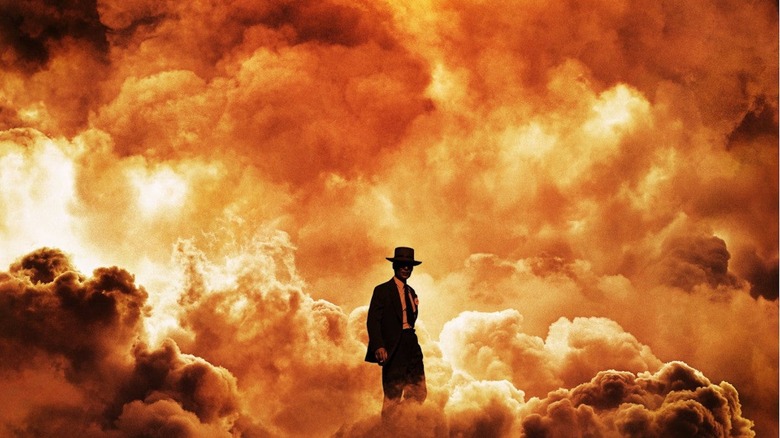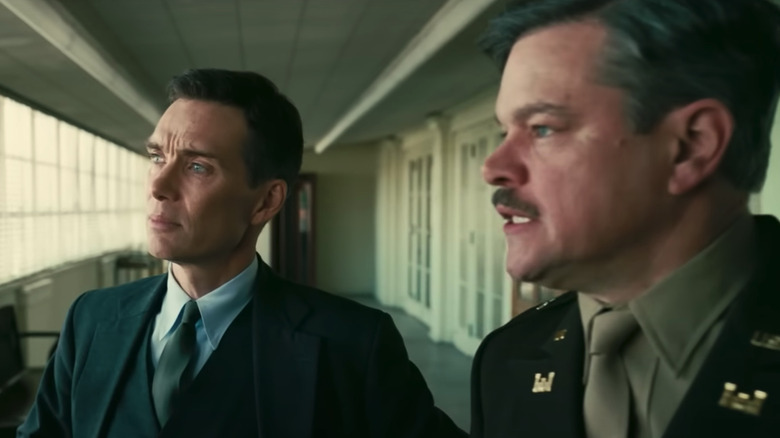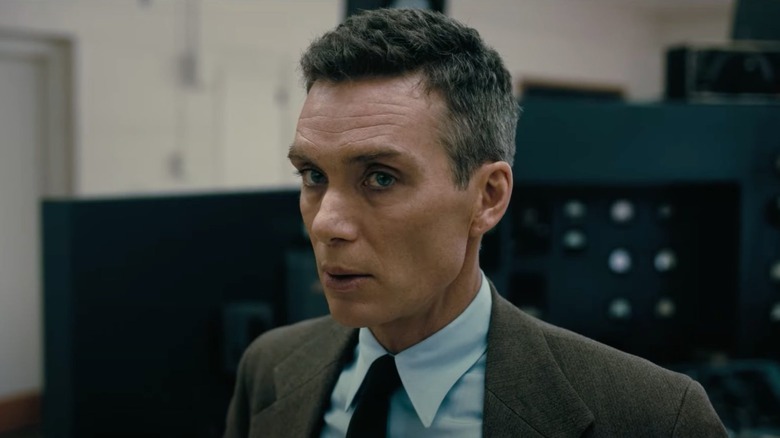Why Christopher Nolan's Oppenheimer Script Was A Challenge For Cillian Murphy To Read
Christopher Nolan's "Oppenheimer" might be the most feverishly anticipated film of 2023. For starters, it's the latest film from one of the most reliably brilliant directors on the planet. Secondly, if you look at the cast, you'll notice that it features every working actor in Hollywood.
And then there's this: for a variety of reasons, J. Robert Oppenheimer, arguably the most pivotal figure in the whole of human history, has never been given justice in a motion picture.
Oppenheimer spearheaded the Manhattan Project, which produced the first successfully detonated nuclear bomb. This weapon of mass, fiery destruction was inflicted on Hiroshima and Nagasaki, Japan as a means of bringing World War II to a definitive end. The objective was achieved so decisively that the weaponry has never been used again.
Oppenheimer is a fascinating man. He was thoughtful, well-read, and ultimately regretful of his creation insofar as their proliferation endangered the future of humanity. Despite his vital service to the United States, he was later smeared as a communist during the Red Scare, which cost him his security clearance. The fact of the matter is that Oppenheimer was a communist, but only philosophically. He never collaborated with the Soviets. Indeed, he actively campaigned to limit the spread of nuclear technology.
Nolan has cast the ever-undervalued Cillian Murphy (seriously, check out his bravura turn in Neil Jordan's superb "Breakfast on Pluto") as Oppenheimer, and the actor was evidently his first choice. Murphy understands he's been given a career-defining opportunity, but when he first read the script, he was floored by the specificity of Nolan's writing.
Sound and fury signifying everything
Screenplays are bound by formal rigidity. Unless you're, well, Christopher Nolan, you daren't compose one without using one of the favored formatting platforms like Final Draft or Fade In. There are screenwriters who can inject their personality into this limiting framework (no one does it better than Shane Black), but most dutifully color within the lines. This is in itself a skill, one that very few people possess — which is why the studios' current effort to devalue the importance of writers is not just absurd, but downright evil.
Still, those who opt to break free of their restraints are deserving of praise, and, according to Cillian Murphy, Nolan did precisely this with his "Oppenheimer" screenplay.
In a director-star Q&A for Entertainment Weekly, Nolan revealed that he flew to Dublin to personally deliver the script to Murphy. Nolan asked Murphy if he was thrown by the first-person perspective of the screenplay, and, indeed, he was. Per Murphy:
"That's the only script that I've ever read that's been in the first person. It took me a minute, maybe a bit more than a minute, to figure that out. But then it became clear that you wanted it to be completely subjective, that everything was to be seen through the character's eyes as it were, and, again, yeah, that added massively to the terror. [Laughs] But when it's Christopher Nolan, you just have that confidence. You believe 100% in his vision, as I have always done. So it was terribly exciting."
A destroyer of worlds with a conscience
If you're writing a screenplay from a subjective point-of-view, you're probably planning on directing it. Because if you're not, no matter how good the writing is, it's almost certainly getting rejected. Off the top of my head, I can think of one other screenplay written in the first person. That's Joe Carnahan's adaptation of James Ellroy's "White Jazz," which nearly got made with George Clooney in the lead role. It's one of the best scripts I've ever read, but it was so unremittingly bleak — in other words, faithful to Ellroy — that I'm not surprised it fell through.
"Oppenheimer" could be an incredibly bleak movie, but the notion of a first-person perspective here promises an interior monologue from the self-proclaimed "destroyer of worlds." In 2023, the world misunderstands J. Robert Oppenheimer. Sadly, the majority of the populace probably has no idea who he is. Roland Joffe's "Fat Man and Little Boy" was the last movie to reckon with Oppenheimer's legacy, and it maintained an incurious distance (aside from John Cusack's portrayal of doomed physicist Louis Slotin, renamed Michael Merriman in the film).
Drilling down into the psyche of Oppenheimer, the man who gifted humanity the means of its own extinction, is a long overdue cinematic prospect. We're fortunate to have Nolan at the helm of this endeavor, and Murphy playing the enigmatic orchestrator of our potential destruction.


